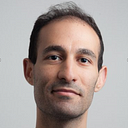Love Flicks Your Brain’s Commitment Switch
Love is a smoke raised with the fume of sighs
— William Shakespeare
Romantic love is a powerful social force, but you don’t need me to tell you that. Many of our most dramatic memories are likely to come from interactions with people we adore. When we profess our love but the feeling isn’t reciprocated, it can leave us feeling lonely, embarrassed, and even depressed. When love is requited, it is almost the mirror image: elation, motivation, and boosted self-worth. These experiences have inspired some of the greatest literature and most popular entertainment in history, from Shakespearean tragedies to Witherspoonian romantic comedies. How do we fall in love in the first place, and why is it so breathtaking?
Let’s start in the brain. Are there any patterns of brain activity that predict whether we will like someone when we meet them? Researchers tested this question by putting participants in a brain scanner and analyzing their brain activity while they looked at photographs of prospective romantic partners. After the brain scanning, participants actually got to meet the people from the photographs at a speed-dating event. This gave the researchers a great opportunity to examine whether the brain activity they measured in response to the photographs predicted decision-making…
